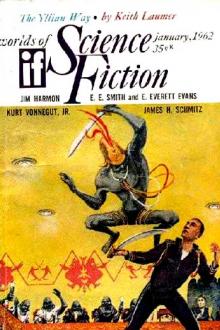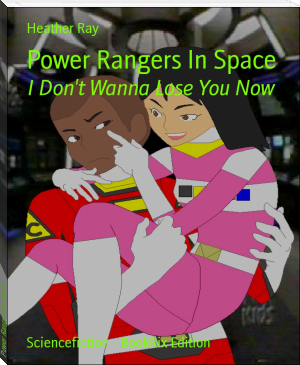Alien Pets - Trisha McNary (free e books to read online .TXT) 📗

- Author: Trisha McNary
- Performer: -
Book online «Alien Pets - Trisha McNary (free e books to read online .TXT) 📗». Author Trisha McNary
M. Hoyvil had waited politely during the doctor’s long speech. The oldest of the Verdante adults were the longest talkers, he had found, but they were also due the most respect. M. Hoyvil spoke in what he hoped was a polite manner.
“Actually, I’ve been thinking about this, and it seems strange to call Antaska a ‘pet’ when she’s really a person. I think I’d rather call her my companion instead. After all, she is a sentient humanoid, not a mere animal.”
Potat turned toward him and let out a small hiss, and he paused in surprise.
“My apologies,” he addressed the words telepathically to Potat and then turned back to speak silently to the doctor. The revelation of Potat’s telepathic abilities had given birth to a new and even more disturbing concern.
“Her cat is telepathic. What if Antaska becomes telepathic too and finds out that we Verdantes take humans as pets—we don’t hire them as they’re told? I’m sure she’d be offended. And anyway, I don’t think it’s ethical to take her genetic material and use it without her permission—or her pet’s DNA,” he added.
“I don’t mind calling Antaska something else besides ‘pet’ since someone else has claimed prior ownership,” said the big doctor.
He glanced at Potat with amused, upward-titled eyes.
“But I can assure you it’s very unlikely that one individual will suddenly become telepathic. It just doesn’t happen that way. You should know from your anthropology classes that a species as a whole becomes telepathic gradually over what could be millions of years.
“However, I would argue that our taking her DNA is not unethical since it’s no different than the current practices of her home planet. As you know, the North and South Pole Earth governments have complete control over human reproduction. All new humans are created in the birth labs from government-approved genetic mixes. In addition to sterilizing Earth humans at birth, their scientists collect much more material than what we take from our human passengers.
“We understand that this practice is just one of many population-control measures the Earth humans put into place after the near loss of all life on the planet. They control their populations to avoid the possibility of another apocalypse and the return of their civilization to a stone age, or worse. So they developed rather extreme controlling governments in both poles.
“Even though she is now legally your pet, she actually has much more freedom while living among us. On Earth, she would never be allowed to reproduce her own children if she wanted them. But we allow the humans who travel with us to make that choice. Our collecting her DNA now will allow her to have children if she ever decides she wants them. The veterinarian on the next part of your voyage will only be an apprentice and won’t have the capability to extract her DNA. And if you wait till she returns from the hundred-year trip, her eggs may no longer be usable.
“Also, you should really think about your own future children. As you know, the Verdante gene pool is limited. We need to add material from Earth humans to ensure the continued viability of our own race.”
M. Hoyvil was not really thinking much about his future children at this point in his life. That wouldn’t happen till at least 300 years from now. It seemed like an impossibly long time to a Verdante of his age. But he wanted to give Antaska the choice of having her own children in the future. He also wanted to give her the choice of cloning Potat, even though he found cloning somewhat distasteful in general.
“Very well, you’ve convinced me. I’ll sign the release form for both of them,” he said with a telepathic sigh of resignation.
“Finally,” continued the doctor, “they’re both malnourished due to that ghastly excuse for food they eat on Earth. The humans living on Earth continue to resist our attempts to improve their diets by insisting on eating harmful garbage,” he fumed.
“There will be no more of that now that they’re in my care,” said M. Hoyvil with an air of responsibility. “I can already see an improvement from just the few healthy meals they’ve had so far on the space ship. They seem perkier and more alert.”
“That’s wonderful,” answered the doctor. “I’ll keep them here overnight, and you can get them in the morning. Since you’ll be traveling through deep space, I’ll put locator chips in their ears in case they get lost or stolen.”
Antaska was relieved when the two aliens finally stopped staring at each other, and M. Hoyvil turned and spoke out loud to her.
“Dr. Daji wants you both to stay here overnight for treatment. He needs to do some minor cellular repairs. It will be painless, and you’ll sleep right through it. Will that be OK?” he asked her.
Antaska agreed somewhat nervously. The large alien doctor pressed another button on the exam table, and Antaska and Potat were surrounded by soft orange light.
In what seemed like the next moment, Antaska opened her eyes to find herself lying on a round bed with white bed covers in a small, round white room. Potat was curled up asleep by her side. A chime sound came from the door to the room, and it opened.
“May I come in?” asked Dr. Daji.
He peeked his enormous green head around the edge of the door.
“Yes,” Antaska answered.
The noise had woke Potat, and she looked up groggily.
“M. Hoyvil is here to take you back to your quarters now,” said the doctor. “Your treatment is complete, and you are both in good health for the voyage. Are you ready to go?”
“Yes, we’re ready,” Antaska answered for both of them.
She got up and found the cat carrier on a nearby table. M. Hoyvil entered the room and looked at Potat, and Antaska heard some more whispering sounds.
“I think she wants to walk,” said M. Hoyvil.
“We can try that,” Antaska answered doubtfully.
“Meroww, mrow, mroww!” said Potat.
Then Antaska heard that small voice in her head again.
“Don’t put me in that cage like a prisoner! I want to walk! And stop pretending like you don’t hear me because I know you do.”
The medical treatment has left my head fuzzy and groggy. It’s making me imagine stuff again, Antaska told herself.
M. Hoyvil placed Potat on the floor. Much to Antaska’s surprise, the little cat followed them down the hallways of the space ship all they way back to their quarters. And she didn’t run off or stop to sniff and scratch at anything.
Antaska considered the possibility that Potat could be more intelligent that she had given her credit for. She knew that cats in these modern times were more evolved and lived much longer than the house pets they had been in Earth’s ancient days. History books said that before the great apocalypse over one million years ago, unlike the ancient dogs, cats couldn’t be trained to perform tasks helpful to humans. In the case of Potat, Antaska didn’t think she was showing that she could be trained, rather that she preferred to walk.
As they traveled through the hallways, they passed Verdantes of various sizes, some accompanied by Earth humans. Antaska heard faint whispering whenever they drew near. The humans stared with interest, some with big smiles, at little Potat rushing along beside them with quick movements of her short legs. The tall Verdantes waved their fingers and stared silently at M. Hoyvil but didn’t seem to notice the small cat.
Back in their quarters, M. Hoyvil noticed that Potat was tired out from the long walk. She headed straight to Antaska’s bed for a nap. M. Hoyvil felt recovered from his last big vocal conversation with Antaska. So he decided to work on some more bonding with her as Master Meeepp had recommended.
“Would you like me to tell you some details about our voyage?” he asked her.
“Yes, please,” she answered.
“Our first stop will be the Verdante home planet, located in the KOI-351 star system. On our way there, we’ve already passed some of the solar systems closest to Earth: Proxima Centauri, Rigil Kentaurus, Barnard’s Star, Wolf 359, etcetera. It’ll take about a month to complete the trip to the home planet, and we’ll stay there for about a week. When we land, some people will leave the ship and some will board, and we’ll load up with supplies for our hundred-year journey.”
M. Hoyvil’s vocal chords felt a little strained, but he looked down at Antaska and saw her staring up at him with interest, so he continued.
“Then, before heading out on our exploratory mission, we’ll make one more stop in known space at the Tri-Galaxies Space Station. It’s about three months’ ship travel time from my home planet. We’ll spend about a week at the space station, uploading the latest information on new solar systems that have been discovered. The ship’s crew will plot and register our course with the intergalactic space travel authorities.”
M. Hoyvil paused to grab a drink tube from one of the panel openings in the wall. Antaska walked over and climbed up to sit on the room’s big couch. He took a long sip and then walked over to stand next to the couch. Then he continued.
“At the space station, we’ll get off the ship and stay in special accommodations for Verdantes and Earth humans. The time will go fast with exploring tourist attractions and socializing. Then we’ll take off for deep space—on our way to increase our knowledge of the Milky Way galaxy and discover new sentient beings. That’s the basic overview of our trip,” he concluded. “Do you have any questions?”
The description of the trip was all that Antaska had dreamed of. All her life, she had longed for the coveted assignment of traveling to deep space working for the Verdantes. Forgetting about the tall Earth man who had been so much in her thoughts for the last two days, Antaska was filled with a new energy and enthusiasm. She wanted to get started with her new work right away.
“Can you tell me what my job responsibilities will be as your assistant on the trip?” she asked M. Hoyvil.
“Sure,” he answered. “Today is your first day as my assistant, and you’ll experience the regular routine of a workday. After breakfast, we’ll start every day with strenuous exercise in the gym. You’ll be in a class with other Earth humans. I know you exercised every day when you were in space school on Earth. But this will be much more intense.”
“Why’s that?” Antaska asked.
M. Hoyvil explained. “It’s because the life-extending diet supplements you’re getting in your food only work when combined with exercise. As you probably know, exercise lengthens your telomeres—the DNA molecules that affect aging. Cells die when your telomeres get too short to be able to divide, and then you get old and die. Exercise alone will only extend your life about ten to twenty years, but the supplements enhance and increase the effect.
“We give a weaker formula of these supplements to the Earth governments to add to their populations’ food, and we encourage Earth humans to exercise regularly. This has allowed your species to





Comments (0)